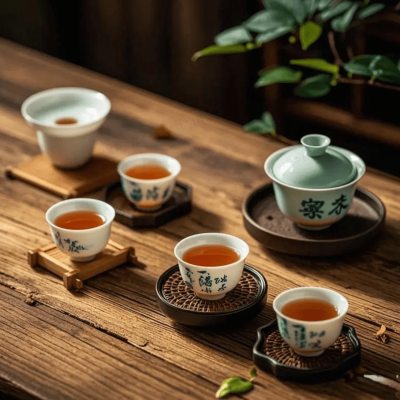Tea, one of the world’s three major beverages (alongside coffee and cocoa), has been consumed for thousands of years. From China’s Shennong Ben Cao Jing (Divine Farmer’s Herb-Root Classic) to modern medical research, the health benefits of tea have been continuously validated. Long-term, moderate tea consumption not only refreshes the mind but also offers profound health advantages. Below are the 10 science-backed benefits of drinking tea regularly:
1. Antioxidant & Anti-Aging Effects: Slows Cellular Aging
Tea is rich in potent antioxidants like polyphenols (especially catechins) and theaflavins, which neutralize free radicals and reduce oxidative damage.
- Key Data: EGCG (epigallocatechin gallate) in green tea has 100 times the antioxidant power of vitamin C.
- Effect: Regular tea drinkers often have firmer skin, fewer age spots, and slower overall aging.
2. Protects Cardiovascular Health: Lowers Chronic Disease Risk
Active compounds in tea improve blood lipid profiles, lower blood pressure, and prevent arteriosclerosis.
- Reduces Cholesterol: Tea polyphenols inhibit LDL (“bad cholesterol”) oxidation, preventing artery blockages.
- Regulates Blood Pressure: Oolong and pu-erh teas contain polysaccharides that relax blood vessels.
- Research: Drinking 3 cups daily reduces cardiovascular disease risk by 20% (European Heart Journal).
3. Boosts Alertness & Cognitive Function
Tea’s caffeine (about 1/3 of coffee’s content) synergizes with L-theanine to enhance focus without causing jitters.
- Focus Enhancement: L-theanine promotes alpha brain waves, inducing calm alertness.
- Neuroprotection: Long-term tea consumption lowers Alzheimer’s and Parkinson’s risks (Frontiers in Nutrition).
4. Regulates Metabolism & Aids Weight Management
Oolong and pu-erh teas enhance fat breakdown and support weight loss.
- Fat Burning: Catechins boost metabolism; drinking tea before exercise increases fat burn by 17% (American Journal of Clinical Nutrition).
- Blood Sugar Control: Thearubigins in black tea slow starch breakdown, stabilizing glucose levels.
5. Strengthens Immunity: Fights Inflammation & Infections
Tea polyphenols and polysaccharides exhibit natural antimicrobial and antiviral properties.
- Antibacterial: Green tea extracts suppress H. pylori (linked to stomach ulcers).
- Antiviral: Catechins block viral replication; tea drinkers have 40% lower flu rates (Japanese studies).
6. Detoxifies the Liver & Reduces Alcohol Damage
White and green teas boost liver detox enzymes, mitigating harm from alcohol and toxins.
- Hangover Relief: Polyphenols accelerate alcohol metabolism (mild tea helps; strong tea is not advised).
- Prevents Fatty Liver: Regular tea drinkers show less liver fat accumulation (World Journal of Gastroenterology).
7. Balances Gut Microbiome & Improves Digestion
Fermented teas (e.g., pu-erh, dark tea) contain probiotics that support gut health.
- Aids Digestion: Theophylline stimulates gastric juice; drink tea 1 hour post-meal.
- Relieves Constipation: Pu-erh’s microbes optimize gut flora balance.
8. Protects Teeth & Reduces Oral Issues
Fluoride and catechins in tea inhibit bacteria, preventing cavities and bad breath.
- Prevents Cavities: Green tea mouthwash reduces plaque (Japanese oral health studies).
- Freshens Breath: Polyphenols kill odor-causing anaerobic bacteria.
9. Reduces Stress & Promotes Relaxation
L-theanine triggers GABA release, lowering stress hormones.
- Anti-Anxiety: 2–3 cups daily reduce cortisol levels.
- Sleep-Friendly: Low-caffeine teas (e.g., white tea, aged tea) can be enjoyed at night.
10. Lowers Cancer Risk
Long-term tea consumption (especially green tea) is linked to reduced cancer incidence.
- Anticancer Mechanism: Polyphenols suppress tumor growth (notably for breast, prostate, and colon cancers).
- Data: Chinese studies show women drinking 4 cups of green tea daily have 30% lower breast cancer risk.
Optimal Tea-Drinking Tips
- Choose Wisely: Green/oolong for energy; black/dark tea for stomach health; white tea for “heat” reduction.
- Moderation: 3–4 cups daily (~600ml); avoid strong tea on an empty stomach.
- Avoid Myths: Overnight tea is safe (but may taste stale); iron-deficient individuals should drink tea 1 hour post-meal.
Tea is not just a cultural icon but a natural health guardian. Embrace it scientifically to unlock lasting vitality and balance. As the Qing Dynasty’s Compendium of Materia Medica Supplements states: “One day without tea leads to stagnation; three days without tea leads to illness.” Let tea become your wellness ally today!
Pro Tip: Match tea types to your constitution—avoid green tea if prone to “cold stomach,” limit black tea if easily “heaty.” Personalized choices maximize benefits!


